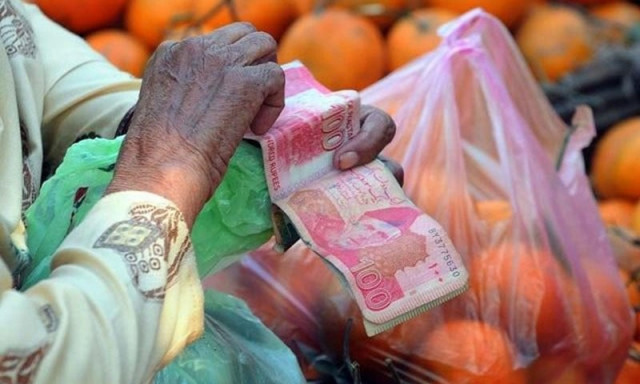Inflation may peak at 37.27% in May
Food prices remain a concern, will register a YoY increase of 47.99% this month

Pakistan’s inflation is expected to rise by 1.07% on a month-on-month basis and reach a peak of 37.27% in May, driven by a persistent uptrend in food prices.
In a report titled ‘May-2023 CPI expected to peak at 37%, base affect to kick in from June’, JS Global, Head of Research, Amreen Soorani explained that the significant increase is primarily due to higher food prices, which account for 30% of the Consumer Price Index (CPI) basket.
Soorani projected that food inflation would register a year-on-year increase of 47.99% this month, with a sequential rise of 0.81% on a month-on-month basis. This marks a slowdown from the recent average of 4.5% monthly growth observed over the past four months. The average inflation reading for the first 11 months of the fiscal year 2023 is estimated to be 29.03%.
However, “the recent decline in petroleum, oil, and lubricant (POL) prices is not expected to be reflected in May-2023’s readings,” she said, noting that if the decline is included, the estimates would decrease by 10 basis points to 37.17% in May.
On the core front, non-food and non-energy (NFNE) inflation is expected to clock in at 30%, another record-high reading, with a month-on-month increase of 2.7%.
From June 2023 onwards, the inflation reading is expected to ease, paving the way for a potential reduction in the central bank’s interest rate in the second half of the next fiscal year 2024 (Jan-June 2024). Soorani projected that after peaking in May 2023, the year-on-year trend is expected to soften due to the base effect from Jun-2023.
“As we expect the FY23 CPI to average at 29%, an average month-on-month trend of 90 basis points is expected to bring the FY24 CPI to 20%. On the core front, we anticipate NFNE pace to decline from 20.4% year-on-year in FY23 to 14.8% year-on-year in FY24,” she added. This is also expected to pave the way for monetary easing in the second half of the next fiscal year 2024.
Experts have highlighted two major reasons for Pakistan’s record-high inflation reading of 36.4% in April: the sharp devaluation of the Pakistani rupee against the US dollar and the global rise in commodity prices. Despite the State Bank of Pakistan (SBP)’s implementation of contractionary monetary policies to curb inflation, inflationary expectations have not subsided.
Last month, a report by the Economic Adviser Wing of the finance ministry stated that, “Although the SBP is enacting [a] contractionary monetary policy, inflationary expectations are not settling down.” The increased interest rates, reaching a record 21%, were intended to contain spiraling inflation but have added a significant fiscal cost in the form of higher debt servicing. This, in turn, has fueled more inflation through borrowings.
In February, a senior economist from Moody’s Analytics expressed that inflation in Pakistan could average 33% in the first half of 2023 before trending lower, and an IMF bailout alone is insufficient to put the economy back on track.
“Our view is that an IMF bailout alone isn’t going to be enough to get the economy back on track. What the economy really needs is persistent and sound economic management,” Senior Economist Katrina Ell said in an interview. “There’s still an inevitably tough journey ahead. We’re expecting fiscal and monetary austerity to continue well into 2024,” she said, adding that Moody’s expects economic growth for the 2023 calendar year of around 2.1%.
There is a likelihood of further monetary tightening in Pakistan to stabilise inflation and address weaknesses in the foreign exchange market. However, it is recognised that these measures alone will not be a complete solution to the country’s economic challenges.
Experts have warned that if the looming default on foreign debt repayment occurs, the inflation reading may spike to hyperinflation. Moody’s Investors Service has stated that without an IMF loan program, the country may face default after June 2023.
Published in The Express Tribune, May 23rd, 2023.
Like Business on Facebook, follow @TribuneBiz on Twitter to stay informed and join in the conversation.



















COMMENTS
Comments are moderated and generally will be posted if they are on-topic and not abusive.
For more information, please see our Comments FAQ